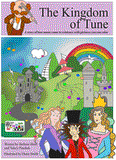Preparatory B (from 3 to 5). Lesson 39
Previous Lesson Next Lesson
To all lessons

Your FREE Demo version is here
Your full version access is here
Why is classical music so important for the development of our children?
Classical music is able strengthen the quality of a child’s attention, to awaken in him or her the perception of the spiritual beauty of the world, to develop intelligence and creativity in each person.
Masterpieces of classical music help little men or women realize their own purpose, spiritual significance and uniqueness. In children, they strengthen confidence in their strength and understanding of themselves as a unique part of the overall harmony.
That is why classical music, the musical thoughts from the masterpieces of world art, as the thought of spiritual abstraction of a higher order, can greatly develop the memory and thought processes of any person starting from early preschool age.
Why is this possible only with classical music?

Classical music leads the way and raises the soul of the child, like engineering designs of water create beautiful fountains. It elevates the perception of the world, leads the child away from concentrating solely on physiological desires and needs.
In classical music, there is a theater with its intrigue, development, main and secondary images.
So, for example, the sonata form offers the listener not one primitive motive and not one musical phrase, but several. But this is not the main thing! In classical music, even the simplest phrases evolve; in pop music, they stay the same.
Moreover, in simple terms, in classical music . . . more notes. And more different nuances in the presentation of these notes. A child learns to listen, to be able to distinguish between intonation, timbre, interpretation of musical images. His or her relationship with the sounds ceases to be thoughtless.
Such music requires a much greater concentration of attention, efforts of will, consciousness, an ability to react and respond to the sounds of the world. And then the child’s soul chooses what it needs for growth and understanding.
The ability to hear . . . Does this not require today to teach us different languages? And not only languages! The ability to communicate with others is based on the ability to hear and understand sounds. Vibrations, intonation, voice, timbre, breathing are often much more truthful than the picture. Without the ability to hear the beautiful uplifting sounds, the child is denied access to understanding the world’s harmony.
Listening to classical music involves, in the process of listening, the ability to analyze material (compare individual intonations, melodies and harmonic turns), feel them (respond to the moods conveyed in music) and remember (be able to recognize intonations, melodic and harmonic turns) simultaneously. It is invaluable for the development of each baby, both hemispheres of his or her brain.
...
Piano Hand Position Exercises by Olga Egorova: 'I am painting'
This exercise is to feel the flexibility of both hands and especially the hands in the right-left-top-down movement. The training was prepared and recorded on video by a piano teacher from Moscow, certified to teach Soft Mozart's system, Olga Mikhailovna Egorova
2. Keep practicing all the previous exercises.
...
1. Continue to read and color the book "Kingdom Of Tune"
2. Learning to match chords to melodies using the program  Gentle Piano®
Gentle Piano®
"Train"
Album Solfeggio Chords 1 Major C
1. Listen to the piece on S
2. Play your left hand on L1 or L3
3. Press LH and try to find a chord to the melody by heart
4. Record the result
...
 If your child is developing faster or slower than our plans suggest, we recommend writing to us at admin@softmozart.com to start working with our certified specialists.
If your child is developing faster or slower than our plans suggest, we recommend writing to us at admin@softmozart.com to start working with our certified specialists.
 Gentle Piano®
Gentle Piano®
1. Master the "Lazy Mary" piece with the TEACHING VIDEOS.
With metronome
Without metronome
2. Music Sight-Reading: ТEASER - Strauss "Radetzky's March" : Memorize RH, LH, P
....
Listen to "Radetzky's March" in concert orchestral performance:
...
Visit our Soft Mozart forum and start your progress diary here. Use the current year section. This is the place for you to ask questions and share your experiences.
At least 2 photos and 1-2 videos of the listed activities will count towards your child's credits for the graduation DIPLOMA. Please upload the video to You Tube, copy the address from the BROWSER window and paste it into your Progress Diary. Do not forget to indicate the year and type of work in the description of your Soft Mozart Academy photo / video.
Sincerely Yours,
Hellene Hiner

Video success:
 Would you like to receive lessons by email weekly? Subscribe to the e-mail lesson here:
Would you like to receive lessons by email weekly? Subscribe to the e-mail lesson here:
All the lesson plans:
For 2+ students
For students from 3 to 5
For students 5+
Always check here, if we have any recital! You and your child will benefit a lot from participating in our concerts!
Your place to start your progress diary is here.


